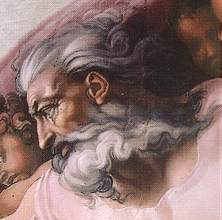The Personification of God
God is everything, through all time. From our perspective, as humans attempting to master our environment, God is the sum of all of the principles of the Universe. Yet in daily living, this is a bit unwieldy. So it would be useful if we could condense the part of it that we use on a regular basis, and make it a bit more accessible.We live most of our lives in a social context — a "he said, she said" world. Even when performing manual labor in solitude, we "think" as we go, imagining conversations that we'd be having if other people were there. To get God's laws into our daily lives, we have to express them in the tokens of daily life, so we have to think of God as a person who speaks to us. Hence it's not that Bob said this, Sally said that, yet the principles of the Universe are like this — rather, it's that Bob said one thing, Sally said another, yet God told me to do this. This gets God into the conversation.In a sense, this seems to "explain away" God, but that isn't correct. He is real, but He is far more complex than any human could possibly understand. To live by God's laws, we need to compress the principles into practices, and express them as advice. All inspired writings acknowledge that God must appear to us in a form that we can understand, which is far less than His entirety. So God becoming human and speaking to us in our native tongue is the way He always was, and always will be.The value of acknowledging God to be a personification of natural law is that whenever possible, we can examine the derivation from the underlying principles, and we can learn. So if somebody says that God wants us to eat our broccoli, we might respond that He said it was OK to skip the broccoli if we already had plenty of green beans, and instead of getting into a debate about whether or not ancient scriptures support either argument, we can look up the nutritional content of the foods in question. It has been said that any course of action can be justified if we know which scripture to quote. Removing the ambiguity and establishing a means of identifying the healthy modern interpretation of the right path to follow is a necessary and important objective.And working with a compression is not an alien concept, even in the most rigorous scientific disciplines. For example, most of us think of matter as being comprised of protons, neutrons, and electrons. With just those three particles, we can understand the Periodic Law, and thus chemistry, and then everything based on it. The broad scope and exquisite accuracy of this framework prove its utility. Yet we also know that it is a massive oversimplification of sub-atomic physics. So we regularly use provable constructs that we know to be simplifications. Similarly, God (as a personification) is just as robust as atomic theory, and just as provable.God is not dead, and He is not an illusion. He is the only reality that we will ever know, while our conception of Him is just that — it's a conception. Within this framework, we can increase the depth of our understanding to the limits of human comprehension, and without the distraction of debates between science and religion.Summary
- Personifying natural law into a conception of God is useful.
- Natural law is absolute, not the personification.











